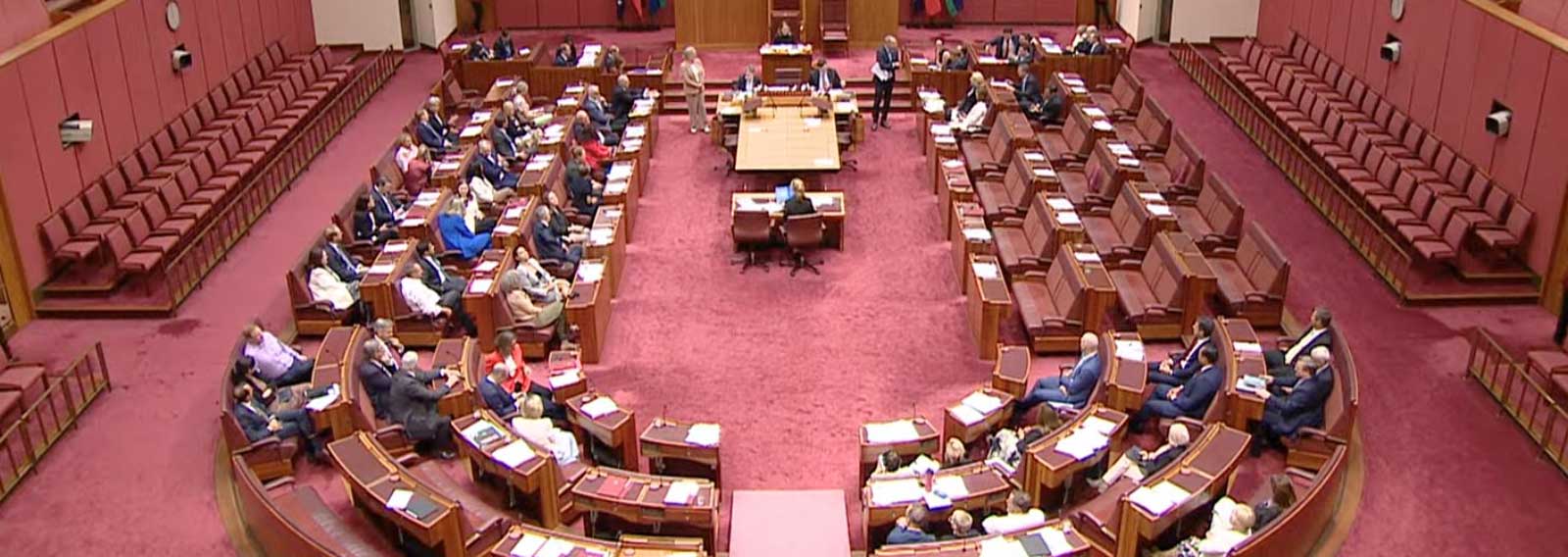There are good reasons for rejecting the diagnosis that the problem with religion is that it discriminates, and the proposed cure that it not be allowed to discriminate any longer.
1. The whole approach is putting Australian law on a radically different basis.
Christianity teaches its followers to think in terms of right and wrong, but the Australian Human Rights Commission, naturally, thinks in terms of rights. In Christianity, it is a sin to bow down to idols, to murder, to commit adultery, to steal, to be covetous or proud, and so on. The basic law is summarised in the Ten Commandments although there are apparently 613 commandments in the Old Testament altogether. The moral law of the Old Testament is, in essence, simply endorsed in the New Testament.
Hence discrimination is necessary. It is wrong to be partial in the sense that justice is perverted to favour a certain group within society (e.g. Ex.23:3; Deut.16:19; James 2:1-4). ‘You shall do no injustice in judgment. You shall not be partial to the poor, nor honour the person of the mighty. In righteousness you shall judge your neighbour.’ (Lev.19:15) It is wrong, for example, for a Christian shopkeeper not to serve a Muslim customer because he or she is a Muslim, or for a judge to favour an accused person because he or she is of the same religion or denomination as the judge. This is the half-truth found in the whole anti-discrimination approach to law.
Nevertheless, Christianity teaches that there is a fundamental discrimination between truth and error, right and wrong. The prophet Elijah called on his fellow Israelites to follow Jehovah (Yahweh) or Baal, not to falter between two opinions (1 Kings 18:21). To believe in Jehovah necessarily means to assert that Baalism or any other alternative belief system is wrong. There are two ways – the way of blessing, law, growth, righteous, and life; and the way of ungodliness, declension, instability and judgment (Psalm 1). All roads do not lead to heaven. Civil liberty may be guaranteed, so far as is possible, but so is a clearly-defined system of morality and law.
But under the ‘rights’ approach, divorced from moral absolutes, it becomes a sin to think in terms of right and wrong. In the Christian scheme of things, the magistrate is to punish evildoers and praise those who do what is good (1 Peter 2:14). In a system governed by moral relativism, the law is supposedly morally neutral; the one real wrong left is discrimination. Such an approach becomes all-embracing. It places the law on a completely different basis to that which has traditionally been the case in the Western world. No doubt, this legislative and judicial shift reflects the wider shift in Australian society towards views of moral relativism. As we shall see, the problem is that rights and freedoms require definition; they can easily compete with one another, and there will be more dependence on lawyers than on law.
According to the utilitarian thinker, Jeremy Bentham, ‘natural and imprescriptible rights’ were nothing more than ‘nonsense upon stilts’. He considered that ‘from the law of nature come imaginary rights – a bastard brood of monsters.'[note]cited in J. W. Montgomery, Human Rights and Human Dignity, Zondervan, Michigan, 1986, pp.82-3.[/note] It was Archimedes who declared ‘Give me a place to stand and I will move the earth.’ The modern rights approach, steeped in moral relativism, grants wide-ranging rights which require a foundation outside of ourselves if they are not to be open-ended and prone to abuse.
2. It is vague, naive and dangerous.
The UN Declaration on the Elimination of All Forms of Intolerance and of Discrimination Based on Religion or Belief of 1981 affirms that ‘Everyone shall have the right to freedom of thought, conscience and religion.’ (Article 1.1). This freedom is not absolute as it may be prescribed by laws to protect public safety, order, health or morals or the fundamental rights and freedoms of others (Art.1.3). It goes on to declare: ‘No one shall be subject to discrimination by any State, institution, group of persons, or person on grounds of religion or other beliefs.’ (Art.2.1) Discrimination between human beings on grounds of religion or beliefs is denounced in the strongest terms as ‘an affront to human dignity’, ‘a violation of … human rights and fundamental freedoms’, and ‘an obstacle to friendly and peaceful relations between nations (Art.3). Hence all states are to take effective measures to prevent and eliminate discrimination on the grounds of religion or belief (Art.4.1,2).
This may sound all very edifying, noble and self-explanatory, but it is not. Would it be possible, for example, to set up a cricket competition which is restricted to members of the Catholic Church? The question is not whether this is a wonderful idea, but whether the state needs to legislate against such a thing as a moral evil. Would it be possible for a Muslim couple to employ a Muslim babysitter over a Christian or agnostic babysitter? Under a strict reading of Article 2, these two scenarios might provide work and income for the lawyers of the Australian Human Rights Commission.
The law may wish to interfere in a number of religious situations which are viewed as undesirable:
a. to curb the practice of suttee (widow-burning) which once was common in Hinduism;
b. to prohibit female circumcision which is enjoined in some sections of Islam;
c. to over-ride the wishes of Jehovah’s Witnesses in order to allow a sick child to receive a needed blood transfusion;
d. to forbid the practice of child-sacrifice which was associated with the worship of Moloch in the ancient world.
e. to forbid the Mormon practice of polygamy, as occurred in the United States in the nineteenth century.
f. to guarantee the right to change religion – notably to ‘apostastise’ from Islam – without fearing threats to life or property.
But the law is able to interfere in such situations now, so nothing would be gained by anti-discrimination legislation.
Much, however, might be lost. What is wrong about a Muslim refusing to employ a woman whom he regards as not adequately covered up so far as her clothing is concerned? Why should a Christian publisher be forced to employ a New Ager? Such situations may prove to be a paradise for lawyers and litigants, but it is difficult to see much else that is worthwhile in this kind of approach. The art of manufacturing grievances is not one to be encouraged.
So vaguely worded is the UN Declaration that it could be interpreted so as to outlaw evangelism. It may become an offence for a Muslim to assert that a Christian needs to believe the Qur’an as the Word of Allah, or for a Christian to assert that the Muslim needs to believe in Jesus Christ as God’s eternal Son.
It should also be pointed out that freedoms compete to a certain extent. The freedom to associate with whomever one wishes necessarily means that freedom of religion cannot be absolute. A Christian Church necessarily discriminates against a Muslim in restricting its membership to those who believe in Christ, His death and resurrection. Indeed, the Baptist Church discriminates against other Christian believers by restricting membership to those who receive baptism by being immersed as adult believers. One cannot curb such discrimination without curbing freedom of association. What appears to confer rights – or recognise them – may, in fact, take them away.
3. There is an implicit – and sometimes explicit – attack on the truth claims of any religion.
What should we make of the cause of a homosexual living with his partner or a woman living in a de facto relationship while teaching at a Christian or a Catholic school? To orthodox Christianity, sexual relations outside marriage constitute sin; to the Australian Human Rights Commission, discrimination is sin. The alarming thing is that those with legal authority apparently wish to impose their definition of sin upon everybody else.
To make religious discrimination unlawful is to make religion unlawful or to confine it strictly to matters of private and public worship. Matters of liturgy could be decided by religious bodies; matters of faith and practice by the human rights lawyers. Prayer is removed from the public arena, but blasphemy is protected. Racial discrimination attacks what a person is inherently and unchangeably. Religious and, for that matter, sexual, discrimination deal with what a person believes and does – something that is neither inherent nor unchangeable.
4. Reliance on lawyers will enrich lawyers and take away freedoms.
There is an over-reliance on law in the human rights approach. Dr Johnson was wiser, and cautions us:
How small, of all that human hearts endure,
That part which laws or kings can cause or cure!
The 1936 Soviet Constitution was perhaps the twentieth century’s most liberal sounding constitution, but it was promulgated during the heyday of the brutal dictator Josef Stalin. While Stalin murdered his friends and his enemies in their millions, Soviet citizens were guaranteed all kinds of rights and freedoms. Small wonder that the ancient historian Tacitus made the pithy comment that ‘The more corrupt the state, the more numerous the laws.’
In 2001 the state Labor government in Victoria passed the Racial and Religious Tolerance Act. This was supposedly designed to stamp out religious vilification. Instead, it led to a long, drawn-out and expensive case against two Christian pastors, Daniel Scot and Danny Nalliah, who had ventured to criticise the Qur’an in the context of a seminar on Christian evangelism. The most cogent criticism of this Act has come from the then Labor premier of NSW, Bob Carr, a religious agnostic, who in 2005 referred to this whole approach to law-making as ‘highly counterproductive.'[note]The Age, June 23, 2005.[/note] To exalt anti-discrimination as the showcase of the modern approach to law will give new meaning to Charles Dickens’ comment in Bleak House that ‘The one great principle of the English law is, to make business for itself.'[note]Charles Dickens, Bleak House, New York: New American Library, reprinted 1964, chapter XXXIX, p.555.[/note]
5. There would be interference in religion where no such interference would be tolerated in politics.
It is somewhat mystifying that there is such a desire to legislate against religious vilification but not political vilification. Also, there is a recommendation to repeal legislation criminalising fortune-telling and enchantment when there is no parallel call to curb electioneering promises, which are far more likely to be believed and produce greater angst and alienation. If political vilification were to be subject to Anti-discrimination tribunals, elections would become bland indeed.
6. The state would become the ultimate authority in matters of religion.
Freedoms are maintained as well as they can be in a fallen world if individuals and organisations are allowed to govern themselves as much as possible. To give the authority an unelected body of lawyers and their associates the right to enforce legislation against something as vague as ‘discrimination’ is to open the door to state coercion.
The discussion paper, Freedom of Religion and Belief in the 21st Century (HREOC, August 2008), asks ‘Do you believe there is equality of gender in faith communities?’ and ‘What do you think should be the relationship between the right to gender equality and the right to religious freedom in Australia?’ Since the HREOC has already committed itself to gender equality and religious pluralism, such a line of questioning can only lead one way. A similar point might be made with the question: ‘How can faith communities be inclusive of people of diverse sexualities?’ The question presupposes the conclusion.
In the days of the Roman Empire, all gods were recognised – on broad and tolerant terms. If only the Church had agreed to Jesus’ being admitted into the Roman pantheon, all would have been well. Article 5 of the UN Declaration lauds the same kind of approach: ‘The child … shall be brought up in a spirit of understanding, tolerance, friendship among peoples, peace and
universal brotherhood, respect for freedom of religion or belief of others, and in full consciousness that his energy and talents should be devoted to the service of his fellow men.’ This is the religion of humanism – Jesus can be lord, but not Lord.
Conclusion
With a Christian approach to law, there is clarity, freedom, order, and the possibility of forgiveness and grace. With the anti-discrimination approach, there is confusion (what exactly is ‘discrimination’?), the possibility of tyranny (the unelected and unaccountable Commission could be judge, jury and executioner), chaos (moral relativism will replace moral absolutes), and no possibility of forgiveness (because there is no such thing as objective sin). It is difficult to see how freedoms are going to be enhanced by giving more power to a body of human rights commissioners. As C. S. Lewis commented: ‘It may be better to live under robber barons than under omnipotent moral busybodies.'[note]C. S. Lewis, ‘The Humanitarian Theory of Punishment’ in T. Robert Ingram (ed), Essays on the Death Penalty, St Thomas Press, Texas, 1978, p.8.[/note]
The cover sheet of the AHRC’s 2008 discussion paper shows a delightful long and winding road. The destination is not so clear – and there is the danger. We could be being led up a garden path.




















